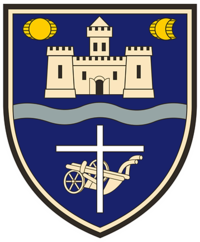Regional self-government of the Hungarian Germans
| Regional self-government of the Hungarian Germans | |
|---|---|

|
|
| Party leader | Ibolya Hock-Englender |
| founding | March 11, 1995 |
| Place of foundation | Budapest , Hungary |
| Headquarters | Júlia utca 9th District II Budapest , Hungary |
| Alignment |
Representation of the Hungarian Germans Cultural Self-Determination Conservatism |
| Colours) | cobalt blue |
| Parliament seats |
1/199 |
| Website | www.ldu.hu |
The self-government of the Hungarian Germans (LdU, Hungarian Magyarországi Németek Országos Önkormányzata , MNOÖ) is the political and cultural representative body of the German-speaking ethnic group in Hungary that was legally anchored in 1993 and 2011 .
The state self-government is the umbrella organization for 406 local minority self-government, over 500 cultural groups and Hungarian-German associations. These are operated by the German schools and cultural institutions in Hungary. The LdU is based in Budapest and is represented by eleven regional offices in the areas with a German minority.
The self-government of the Hungarian Germans
The minority self-government in Hungary was established in 1994 on the basis of the provisions of Chapter IV of Law No. LXXVII / 1993 on the rights of national and ethnic minorities. After the elections of the minority self-government in December 1994, the state self-government of the Hungarian Germans was elected at the electors' assembly of the German minority on March 11, 1995.
In 2011, the Minorities Act of 1993 was replaced by Act No. CLXXIX./2011 on the Rights of Nationalities (Nationalities Act), on the basis of which the LdU pursues its minority policy today.
The declared aim of self-government is to preserve and promote the language, the intellectual cultural heritage, the historical traditions and the identity of the Hungarian Germans . On a cultural level, this includes the preservation and care of the German mother tongue, the promotion of German teaching in the Hungarian school system and the exchange with Germany in the form of partnerships and programs.
The realization of cultural autonomy, i. H. The main focus of the LdU's activities is to take over Hungarian-German institutions.
The organization of the state self-government
The state self-government forms the umbrella organization for 406 local nationality self-government, over 500 cultural groups and Hungarian-German associations across the country.
Election results
Since 2014, the voters of the national minorities in Hungary can vote on the nationality lists. The minorities can thus receive a preferential mandate if they reach a quarter of the ninety-third part of the list votes.
The nationalities that did not receive a mandate can send a nationality spokesman to parliament .
Parliamentary elections
| year |
number
of the registered |
Number of votes | Share of votes | Preference quota | Seats | Top candidate |
|---|---|---|---|---|---|---|
| 2014 | 15 209 | 11 415 | 0.23% | 20 022 |
0/199 |
Otto Heinek |
| 2018 | 33 261 | 26 477 | 0.46% | 23 829 |
1/199 |
Emmerich Ritter |
Parliamentary election in Hungary 2014
The LdU has drawn up a list of nationalities for the parliamentary elections .
The first five seats on the list of German nationality were the following candidates:
| LdU nationality list 2014 | ||
|---|---|---|
| Candidates | 1. | Otto Heinek |
| 2. | Emmerich Ritter | |
| 3. | Ibolya Englender-Hock | |
| 4th | Judit Bárkányi | |
| 5. | Josef Manz | |
In the year 2014 was Emmerich Knight as the first German parliamentary speaker in the history of the Hungarian Parliament voted.
Parliamentary election in Hungary 2018
On March 4, 2018, the LdU nationality list was registered. Registration of nationality voters was completed on March 23rd.
The general election took place on April 8, 2018.
The first 5 candidates on the list were:
| LdU nationality list 2018 | ||
|---|---|---|
| Candidates | 1. | Emmerich Ritter |
| 2. | Otto Heinek | |
| 3. | Ibolya Englender-Hock | |
| 4th | Josef Manz | |
| 5. | Kinga Gáspár | |
Web links
- ldu.hu - own website
Individual evidence
- ↑ Ibolya Hock-Englender is the new chairwoman of the state self-government of the Hungarian Germans , accessed on June 1, 2019
- ↑ Law No. LXXVII / 1993 on the rights of national and ethnic minorities
- ↑ 2011. évi CLXXIX. törvény a nemzetiségek jogairól . In German: Nationalities Law
- ↑ a b c d LdU - regional self-government of the Hungarian Germans - Web center. Retrieved March 17, 2018 .
- ↑ a b Nemzetiségek a választáson - Nemzeti Választási Iroda . In: Nemzeti Választási Iroda . ( valasztas.hu [accessed March 18, 2018]).
- ↑ MNOÖ országos listája. In: www.valasztas.hu. Retrieved March 23, 2018 .
- ↑ Megkezdte munkáját Knight Imre német nemzetiségi szószóló . ( pilisvorosvar.hu [accessed March 23, 2018]).
- ↑ a b Nemzetiségi névjegyzéki nyilvántartás - Nemzeti Választási Iroda . In: Nemzeti Választási Iroda . ( valasztas.hu [accessed March 18, 2018]).
- ↑ Országos lista részletes adatai - Nemzeti Választási Iroda . In: Nemzeti Választási Iroda . ( valasztas.hu [accessed March 18, 2018]).
Coordinates: 47 ° 30 ′ 49 ″ N , 19 ° 0 ′ 21 ″ E